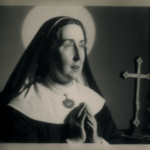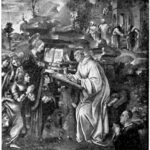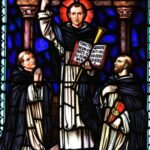St. Augustine of Hippo
St. Augustine of Hippo
St. Augustine of Hippo
When he lived: St. Augustine of Hippo, also known as Augustine of Hippo or simply St. Augustine, lived from November 13, 354 AD, to August 28, 430 AD.
Where he lived: St. Augustine was born in Thagaste (modern-day Souk Ahras, Algeria) in North Africa, which was part of the Roman Empire at the time. He spent most of his life in the city of Hippo Regius (modern-day Annaba, Algeria), where he served as the bishop.
Notable world events during the time of his life:
- The Sack of Rome (410 AD): In 410 AD, the Visigoths, led by King Alaric, breached the walls of Rome, marking the first time the city had been sacked in over 800 years. This event shook the Roman Empire to its core and signified the beginning of its eventual decline.
- The Fall of the Western Roman Empire (476 AD): The Western Roman Empire faced its ultimate collapse in 476 AD when Odoacer, a Germanic chieftain, deposed the last Roman emperor, Romulus Augustulus. This marked the end of ancient Rome and the beginning of the Middle Ages in Europe.
- The Council of Nicaea (325 AD): Although this event occurred before Augustine’s time, its impact resonated throughout his life. The Council of Nicaea, convened by Emperor Constantine, was a significant ecumenical council that addressed theological controversies, including the nature of the Holy Trinity, and resulted in the formulation of the Nicene Creed, which continues to be a central aspect of Christian faith.
- The Life of Hypatia (c. 360-415 AD): Hypatia, a renowned female philosopher, mathematician, and astronomer, lived during Augustine’s lifetime. Her contributions to science and philosophy made her one of the most influential intellectuals of her time, and her tragic death in 415 AD in Alexandria, Egypt, underlines the tensions between pagan philosophy and the emerging Christian dominance.
- The Confessions of St. Augustine (397-401 AD): Among the most famous and influential works of Augustine is his autobiographical masterpiece, “Confessions.” Completed between 397 and 401 AD, this book not only provided an intimate glimpse into Augustine’s spiritual journey but also set the standard for Western autobiographical writing, influencing countless writers and thinkers over the centuries.
- The City of God (413-426 AD): Another significant work by St. Augustine, “The City of God,” was written between 413 and 426 AD. This monumental treatise explored the ideas of God’s providence, the nature of human society, and the eternal struggle between the earthly city and the heavenly city, shaping the development of Christian political and philosophical thought.
His patronage: St. Augustine is regarded as the patron saint of brewers due to his early involvement in a rather loose and carefree lifestyle before his conversion to Christianity. His journey from indulgence to piety, along with his intellectual and spiritual depth, has made him an inspiration to those seeking to reform and change their ways. As the patron saint of brewers, he serves as a reminder that transformation and redemption are always possible, no matter one’s past actions. So, next time you enjoy a delicious brew, you might raise a glass in honor of St. Augustine!
Not a Good Start
Aurelius Augustinus, or Augustine, was born in 354 in Tagaste, Numidia, North Africa (now Souk Ahras, Algeria). His father, Patricius, was a pagan, and his mother, St. Monica, was a devout Christian. He was enrolled as a catechumen by his mother when he was a boy. However, his baptism was deferred to a later time in accordance with the prevailing custom.
Young Augustine possessed a very inquisitive mind as well as an attractive personality. He set his sights on a career that would bring him wealth and fame. His parents sought out opportunities to provide their son with the finest education possible. However, Augustine spent many years of his life living in wickedness and with false beliefs. He was considered one of the most intelligent men who ever lived, and though he had been brought up in the Christian faith, his pride and his sins of impurity darkened his mind so much that he could not see or understand the Divine Truth anymore.
Seeing her son living a wayward life, Monica ceaselessly prayed for Augustine’s conversion. Soon enough, through Monica’s prayers and the great preaching of the Bishop of Milan, St. Ambrose, Augustine finally became convinced that the one and true religion was Christianity. However, he did not outright become a Christian then. This was because he thought he could never live a life of chastity.
A voice woke him up.
However, one day, Augustine heard about two men who, after reading the life of St. Anthony, had suddenly converted. He felt terribly ashamed of himself! He told his friend Alipius, “What are we doing? Unlearned people are taking heaven by force, while we, with all our knowledge, are so cowardly that we keep rolling around in the mud of our sins!” Augustine, filled with sorrow and bitterness, went out and flung himself into the garden. There he cried out in utter sadness, “How long more, Lord?” Why does not this hour put an end to my sins?”
After shedding many tears of guilt and remorse, he heard a child’s voice saying, “Tolle, lege. Tolle, lege”, which means “Take up and read! “Take up and read!” Thinking that God desired him to hear these words,Augustine picked up the book of the Letters of St. Paul. He opened the book and read the first passage his gaze fell upon. He read the admonition of St. Paul to put away all impurity and live in imitation of Jesus—just what Augustine needed to hear! From then on, he began to live a new life.
At the age of 33, Augustine was baptized by St. Ambrose, the bishop of Milan. His decision to finally embrace the Catholic faith and its doctrines was at the same time a commitment to spend the rest of his life as a servant of God in celibacy. This means that he had to leave the woman whom he had deeply loved for years and with whom he had fathered a son named Adeodatus.
Better late than never
After his baptism, which Augustine received together with his son and Alipius, he returned to his hometown, where he desired to live a monastic way of life together with other men who had experienced a radical conversion to the faith. On their way, at Ostia, just outside of Rome, his mother Monica got ill and died suddenly, happy to witness her son’s conversion and commitment to Christ and the Church.
At Tagaste, Augustine and his companions lived a life of intense prayer, work, and community life. They shared their insights about Scripture and the Christian vocation. Three years later, while he was on a visit to Hippo, Augustine was summoned to become a priest. This was contrary to his desire; nevertheless, he accepted what he believed was the will of God for him. He also established a monastic community in Tagaste, while at the same time he became an assistant to the bishop Valerius. Several years later, Augustine succeeded Valerius as Bishop of Hippo. While he was bishop of Hippo, he wrote his Rule for the continued direction of his monastic community in Tagaste.
Augustine realized that his desired life of contemplation and asceticism greatly influenced his pastoral work as leader of the local church as well as that of a civil official, which the office of bishop at the time included. In addition to his pastoral duties within Hippo, he traveled to church councils in the region of North Africa forty to fifty times over the course of the 35 years he served as bishop. Augustine overcame strong heresies, practiced great poverty and supported the poor, preached very often, and prayed with great fervor right up until his death.
After years of service, Augustine fell ill in 430. He spent his remaining days and nights praying the penitential psalm, which he asked to be written on the wall of his room. As the city of Hippo was invaded by the Vandals on August 28, Augustine died. His mortal remains were laid to rest in Hippo but were later taken to Sardinia for safekeeping and finally to Pavia in Northern Italy, where they now rest in the Basilica of San Pietro in Ciel d’Oro. Augustine of Hippo was canonized in 1303 by Pope Boniface VIII. His feast day is August 28.
Five Interesting Facts About St. Augustine of Hippo
- St. Augustine of Hippo is the patron saint of brewers, printers, and
theologians. - St. Augustine of Hippo is one of the four great doctors and fathers.
of the West. With him are Ambrose, Jerome, and Gregory the Great. - St. Augustine wrote Confessions, his most honest and personal
autobiography. This work of his is considered one of the classics.
in spiritual literature. - Because Augustine’s work was immediately considered very important,
A lot of his writing has survived, about 5,000,000 words (approximately
100 of these books). - In his Confessions, St. Augustine of Hippo recounted how he first
became aware of sin when he and his friends stole some pears.
Prayer to St. Augustine of Hippo
Renew in your Church, we pray, O Lord, the spirit with which you endowed your Bishop Saint Augustine, that, filled with the same spirit, we may thirst for you, the sole fount of true wisdom, and seek you, the author of heavenly love. Through our Lord Jesus Christ, your Son, who lives and reigns with you in the unity of the Holy Spirit, one God, for ever and ever Amen.



